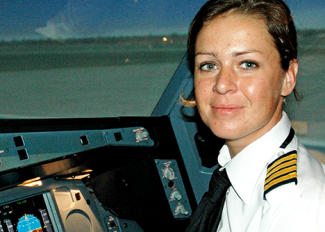AIRLINE SELFIES
Airlines freer to use company standards to test company pilots

IS AIR SAFETY TOO IMPORTANT TO BE LEFT ALL TO THE AIRLINES? Transport Canada doesn’t seem to think so.
The federal agency has decided to give the airlines even more responsibility for keeping us safe in the air. Starting this fall Transport Canada will let the airlines decide whether or not the people testing their pilots are qualified enough to do the testing.
That is: an airline like Westjet will be deciding, on its own, whether certain Westjet pilots are qualified to be testing other Westjet pilots to see it they should be flying for Westjet airlines.
The obvious conflict of interest here, and potential increased public risk, is lost on the government agency—and roundly dismissed by airline industry flaks.
Public vs corporate priorities
“Public safety is inevitably going to be challenged by corporate priorities,” said Greg Holbrook, director of operations with the Canadian Federal Pilots Association, the union representing 450 government aviation inspectors.
In order to maintain their credentials, pilots must regularly undergo what is known as a “Pilot Proficiency Check,” which tests their abilities under regular and emergency flying conditions.
But Transport Canada doesn’t have nearly enough inspectors to do all the testing required, so for the last 25 years the department has used “check pilots.” These pilots are employed by commercial airlines like Westjet or Air Canada, and have been approved to administer the tests. They often work for the same company as the pilot they are evaluating.
Transport Canada inspectors set higher standards. Overall pilot failure rate is small, less than 4%. But, from 2005 to 2016, twice as many pilots were failed by Transport Canada inspectors than by industry-employed check pilots
With the policy change Transport Canada inspectors will be less involved in ensuring those who are testing and signing off on Canada’s pilots as up to par.
Holbrook believes conflicts are inevitable. He described how an evaluator conducting a pilot proficiency check on a friend and workmate might feel pressure to pass their colleague, even if he or she didn’t quite meet the standard.
Holbrook says the evaluator is bound to ask himself: “Do I have to satisfy Transport Canada, or do I go along with what my boss wants, with the one who signs my paycheck, and pass the guy?”
‘Further erosion’ inevitable
Transport Canada’s own risk assessment last year found that implementing the new system would result in “a further erosion” of its ability to keep an eye on how the industry polices itself.
In 2017, Transport Canada inspectors performed 300 pilot proficiency checks compared to 15,000 by industry-employed testers.
Newly released statistics seem to bear out critics’ fears. Until last year, the number of accidents and incidents involving commercial aircraft were on a steady decline in Canada.
But in February, the Transportation Safety Board revealed that there had been 94 incidents involving commercial aircraft operators in 2017, a jump from the 63 recorded in 2016 and much higher than the five-year average of 79.
“If there was ever a time for Transport Canada to get into the cockpits, to get back to providing oversight, to get back to providing checks on a regular basis, the time is now,” said Greg McConnell, national chair of the Canadian Federal Pilots Association (CFPA), which represents government pilots and inspectors.
“I hate to say we’re on the precipice of something bad, but we are.”
Cutting into profits always an issue
Failing a pilot means grounding them, and potentially sending them back into a flight simulator to practice.
If a company doesn’t own their own simulators, they need to pay to use one and often pay extra to cover the pilot’s hotel room and per diems during re-training. The company might even have to adjust its flight schedule, shuffling other pilots around to compensate.
Transport Canada’s inspectors don’t care about any of that, McConnell noted.
The new Transport Canada policy just pushes the industry one step closer to self-regulation, said McConnell.
“It’s a good (regulatory) system, it requires more vigilance, it requires more oversight on behalf of transport Canada,” he said. “You need to have the cops on the street.”
- 30 -












Add new comment